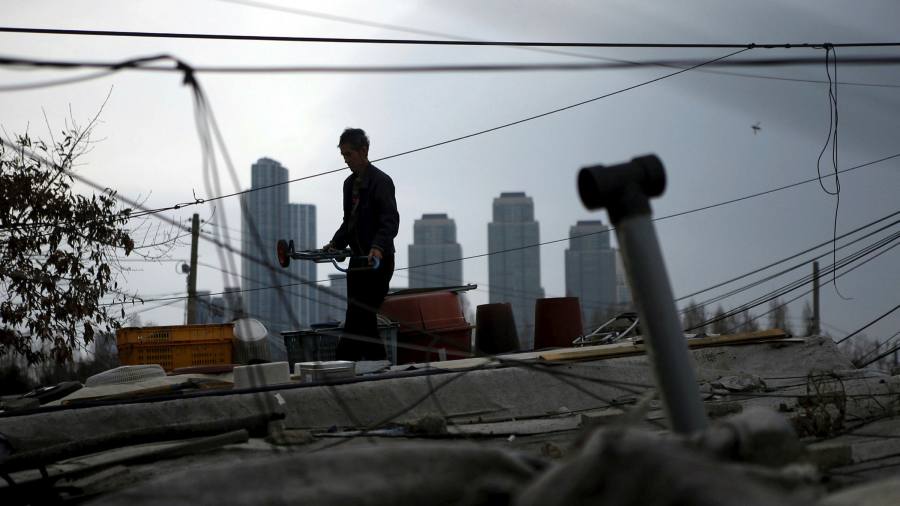
South Korea’s ‘Bernie Sanders’ touts universal basic income ahead of polls
A universal basic income (UBI) of more than $400 a month is moving closer to reality for South Koreans as leading presidential candidates vow to unleash radical policies to combat worsening inequality.
The UBI — a government programme whereby the state unconditionally pays everyone a monthly sum — is viewed by some economists as a fix to entrenched poverty and by libertarians as a way to demolish bloated bureaucracies. But critics believe the policy is impractical and unaffordable.
Lee Jae-myung, who won the ruling party’s primary race this weekend, has vowed to progressively roll out the policy over his five-year term if he wins the presidential election in March, potentially making the Asian nation the first country to adopt a national UBI.
“Real freedom is possible only when basic life conditions are guaranteed in all areas including income, housing and financing,” said Lee, who has been likened to Bernie Sanders, the leftwing US senator.
He added that South Korea “should be a country where unfairness and inequality are resolved and there are abundant opportunities and dreams through sustained growth”.
Under Lee’s plan, all South Koreans would initially receive a Won1m ($840) annual payment that would be progressively expanded over the years until they reach a monthly sum of Won500,000 ($420).
Lee, of the leftwing Democratic party and governor of the country’s most populous province, is building a popular platform based on aggressive welfare spending, low-priced public housing and cheap loans for the poor.
But the 56-year-old is not alone in looking to untested ideas to counter chronic problems that successive governments have failed to combat: soaring education and housing costs, mounting household debt, rising youth unemployment, unparalleled elderly poverty and the world’s lowest fertility rates.
“As the health crisis drags on, people agree that we need a stronger social safety net. So they are gradually accepting some of the radical platforms that were long seen as socialist ideas,” said Park Chong-hoon, head of research at Standard Chartered.
Kim Dong-yeon, a popular former finance minister who is trying to model himself on French president Emmanuel Macron, wants to go even further and completely overturn the county’s legal system.
“The Korean law stipulates only things that are legal so the rest is considered illegal. But it should be the other way around like in many other advanced countries,” Kim, who is planning to run as an independent candidate, told the Financial Times. He believes the overhaul is necessary to spur deregulation and unlock innovation.
Kim is a career bureaucrat who pulled himself out of poverty after discovering a discarded civil service examination book in a rubbish bin. But now he wants to abolish the entrance exams to boost the quality of the country’s bureaucracy, potentially shattering a taboo of life-long security promised to civil servants.
Conservative opposition candidates are also embracing the giving mood in a turn away from their more austere economic and market-based tendencies.
They have sharpened their focus on property prices, a central symbol of South Korea’s growing economic polarisation.
Apartment prices have almost doubled since President Moon Jae-in took office in 2017, despite at least 20 new policy initiatives designed to combat price increases.
Many middle-class households are priced out of the property market, with average apartment prices in Seoul hitting $1m, a threshold few Koreans thought possible.
Yoon Seok-youl, the former chief prosecutor and leading opposition candidate, is trying to attract young voters with a pledge of 500,000 half-priced housing units. Other candidates have proposed a series of massive development projects, including relocating a military airport just south of the capital to boost land supply for housing.
Critics, however, question the sustainability of the plans, citing funding problems.
Paul Choi, an economist at CLSA, an investment group, said a victory for Lee might provide a short-term “steroid effect” but risked the long-term health of Asia’s fourth-biggest economy.
The focus on inequality marks a stark change from five years ago when Moon rose to power on the back of a spectacular corruption scandal involving Park Geun-hye, the impeached former president.
Booming exports and a robust healthcare response helped South Korea achieve one of the world’s fastest recoveries from a pandemic-induced recession last year. But senior officials concede they have been caught off-guard by the speed at which the gap between rich and poor has widened during the coronavirus pandemic.
Shin Yul, professor of politics at Myongji University in Seoul, said next year’s polls looked set to be “dominated by populism”.
“With many people in economic trouble, they want a charismatic leader with a strong image,” Shin said, “regardless of how plausible their platforms are.”
Stay connected with us on social media platform for instant update click here to join our Twitter, & Facebook
We are now on Telegram. Click here to join our channel (@TechiUpdate) and stay updated with the latest Technology headlines.
For all the latest Education News Click Here
For the latest news and updates, follow us on Google News.

